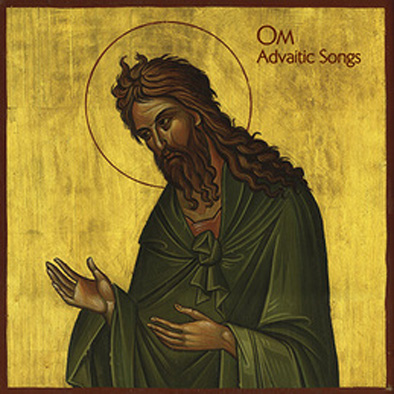 2009's polarizing God is Good alienated quite a few long-time Om fans, a situation that this album is highly unlikely to remedy–it looks like Al Cisneros' fascination with sitars, strings, and tablas is here to stay.  In fact, Om has never sounded less like Om, which I find a bit troubling.  Still, Al's ambition and intensity are almost sufficient enough to make it all work.  Despite its occasionally awkward attempts at grandeur and exoticism, Advaitic Songs is ultimately a very listenable and uncharacteristically varied batch of songs.
2009's polarizing God is Good alienated quite a few long-time Om fans, a situation that this album is highly unlikely to remedy–it looks like Al Cisneros' fascination with sitars, strings, and tablas is here to stay.  In fact, Om has never sounded less like Om, which I find a bit troubling.  Still, Al's ambition and intensity are almost sufficient enough to make it all work.  Despite its occasionally awkward attempts at grandeur and exoticism, Advaitic Songs is ultimately a very listenable and uncharacteristically varied batch of songs.
Before I begin chronicling my myriad frustrations with this album, I think it is important to point out that I actually love Om.  I think Al Cisneros is one of the most singular and compelling people making music right now and I will probably keep buying his albums forever.  Consequently, my exasperation with Om's recent work is that of a fan trying to come to grips with some seriously puzzling artistic decisions in the midst of otherwise stellar work rather than any kind of dislike.  I want (and expect) to love each new Om album, but lately there have been some serious flaws to struggle with.
The fundamental problem with Om is that Cisneros is brilliant in a very narrow way: Om are at their best when Cisneros is simply speak-singing his impenetrable but unsettling metaphysical dispatches over a propulsive ride cymbal groove.  The essence of Om is essentially "great drums" plus "unnaturally intense frontman who sounds like prophet that just emerged from a decade in the desert."  That is all.  Any divergence from that formula is a dangerous move and Cisneros diverges a lot here.
I can certainly understand his motivation though: it is clear that Al wants to avoid repeating himself and that is very hard to do with a palette of just bass and drums.  Also, some of his new ideas are quite good, particularly the crackling mullah call to prayer that opens "Sinai."  I have also belatedly come around to embrace Om's recent use of droning synths and sitars.  Unfortunately, there are some other innovations that work less well.  For example, Kate Ramsey's guest vocals in "Addis" are certainly likable, but they cause the band to sound a lot more like Dead Can Dance than Om (a problem that is compounded by the fact that Cisneros never sings and drummer Emil Amos sticks solely to the tambourine).
Also, while I like the texture and depth provided by Advaitic Songs' rampant cellos, violins, and violas, they are employed in a way that sits a bit uncomfortably within the Om aesthetic.  The band's greatest strength has always been its eschewing of hooks and melodies in favor of achieving a heavy, trance-like groove.  Adding lengthy, melodic string passages is not necessarily the kiss of death, but they tend to go for epic majesty here, which feels overdramatic amidst such understated music.  Besides, Cisneros' ominous shamanic vocals are gripping enough on their own.  The other problem is simply that Advaitic Songs is loaded with such instrumental motifs.  Sometimes they work well, sometimes they do not, but in both cases they are diluting the essential Om-ishness of the band.  In fact, I think Amos and Cisneros only lock into their characteristic killer groove in three of the five songs (and Al only nods to his metal past by stomping his distortion pedal for two minutes of "State of Non-Return").
On a more positive note, Om are as great as ever on the rare occasions when Emil Amos gets a chance play his full kit.  I could listen to him forever and I love that these songs have enough space to make every single nuance perfectly audible.  Cisneros is in similarly peak form, unleashing wonderfully sinuous bass lines and confounding me with his usual awesomely cryptic narratives ("light trickles through the adjunct worlds, the soul galleon prevails").  There are not any sustained bits of greatness on the level of God is Good's 19-minute "Thebes," but there are a number of shorter flashes of inspiration and Advaitic Songs is ultimately a much more coherent and fully realized work than its predecessor (though it might err on the side of overwrought at times).
Despite Om's over-reaching ambition and their puzzling reluctance to get visceral, lock into extended grooves, or play to their strengths, this is actually still a pretty enjoyable effort (even if it does not always sound quite like Om because too much light trickled into the adjunct worlds of strings and tablas).  I, of course, hope that this is merely another transitional effort rather than an endpoint, but the continued evolution of Cisneros' songcraft is very promising.  And I would still much rather listen to an uneven Om album than most other bands' best work.
Samples:
 
Read More


